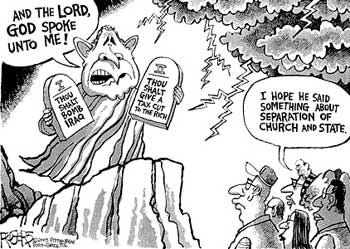“Regarding the reconstructionist beliefs. I had a run-in with a believer of this fairly new doctrine on another list recently. He was very subtle and insidious in his manner, but clearly a proponent of old testament law. Scary, huh?”
Edward: Reconstructionism is not a new doctrine, itʼs ages old, itʼs Calvinism, straight up, no ice. Just like it was served by Calvin and Luther and other Reformers at the dawn of the Reformation. See chapter two of Leaving The Fold for more info and footnotes on Calvin and Luther.
“Somebody tell me it canʼt possibly happen in America, quick!”
Edward: Sinclair Lewis published a book on exactly that topic in the 1920s or 30s, titled, “It Canʼt Happen Here”, in which a conservative religious minority took over the government of the country. Heck, Hitler only had about 30% of the country truly on his side. And there are that many self-proclaimed highly devout funda-geli-costal Christians in America. What they lack is cohesion, a central unifying political figure they would all be willing to rally round. Pat Robertson was hoping he could be that figure, but things didnʼt work out. Thank God for all the divided sects and Biblical interpretations! Or perhaps thank God for the lack of clarity in the Bible that allowed thousands of divisive Christians sects to arise.
Innovatia dennis@ writes: We are better off because of the past history of righteousness and upholding of Jesus as Lord in America

Edward: What would a “righteous Jesus Lordly America” be like by the way? How different from Calvinʼs Geneva at the height of itʼs intolerance? Or how different from an Early American Puritan town (the Puritans got to American only to start anathematizing each other and splintering into different denominations, banishing those with different views, and hanging others). Or how different from a Wahabist Muslim state like Iran?
By the way, the Southern States in the U.S. were the more “Christian” ones during the Civil War, they even rewrote their Constitution to invoke “God,” and preachers declared the South the “new chosen nation of God,” and they cried the loudest for secession. Apparently God couldnʼt hold that new “God-invoking” nation together.
I think America and the world are better off for a wide variety of reasons:
One major one being that America was a pristine land with plenty of eastern waterways to run mills. We stole patents and ideas from Britain. We imported slaves until the cotton gin was invented and the Civil War ended slavery.
And if not for a host of scientists who happened to be either lapsed churchgoers, unorthodox Christians, heretics, apostates, infidels, freethinkers, agnostics, or atheists, and their successes in the fields of agricultural and medical science, hundreds of millions would have starved to death or suffered innumerable diseases this past century. Those agricultural and medical scientists “multiplied more loaves of bread” and “prevented/healed more diseases” in the past hundred years than Christianity has in the past two thousand.
Also, it has not always been the most orthodox of Christians who have changed the face of charity worldwide for the better. Florence Nightingale (the lady who helped make nursing a legitimate profession, and taught that no one should be refused admittance to a hospital based on their religious affiliation, and no patient should be proselytized in a hospital, but instead they should be allowed to see whichever clergy person they preferred) was not an orthodox Christian, but instead a freethinking universalist Christian. (Ms. Nightingale also wrote some steamy letters that suggest she may have been bi-sexual or a lesbian.)
The founder of the International Red Cross (now called the International Red Cross and Red Crescent), Andre Dunant, was gay.
Clara Barton, founder of the American Red Cross, was another freethinking universalist Christian.
Dr. Albert Schweitzer, who spend years in Africa as a doctor and helped to publicize the plight of suffering Africans, was a liberal Christian and author of the The Search of the Historical Jesus in which he concluded that Jesus was a man who preached that the world was going to end soon.
And, Helen Keller (the woman who lost her sight and hearing to a bout with Scarlet Fever when she was very young, but who learned how to communicate via touch, and who proved an inspiration to several generations of folks suffering from severe disabilities) was both a Swedenborgian, and a member of the American Humanist Society.
America also benefited from the shrewd insights of the founding fathers who were well aware of the wars of religion in Europe, notably the Thirty Yearsʼ War, perhaps the worst war Europe ever saw, Christians killing Christians, and they all believed in creationism, the Trinity, and Jesusʼ divinity.
So I think weʼre better off because of the founders of the original Constitution who placed the first amendment, “Freedom of religion,” above the first commandment “Thou shalt have no other gods before me.” In fact, the founding fathers at the Constitutional Convention voted whether to pray before meetings and whether to mention God in the constitution, and voted against both suggestions.
Which reminds me of something that Dr. Albert Schweitzer (the liberal Christian theologian who focused on “reverence for life,” and who worked as a medical missionary in Africa for decades) pointed out: “For centuries Christianity treasured the great commandment of love and mercy as traditional truth without recognizing it as a reason for opposing slavery, witch burning and all the other ancient and medieval forms of inhumanity. It was only when Christianity experienced the influence of the thinking of the Age of Enlightenment that it was stirred into entering the struggle for humanity. The remembrance of this ought to preserve it forever from assuming any air of superiority in comparison with thought.” Also in the same book, Schweitzer cautioned against “the crooked and fragile thinking of Christian apologetics.” [Albert Schweitzer, Out of My Life and Thought: An Autobiography (New York: The New American Library, 1963)]


No comments:
Post a Comment